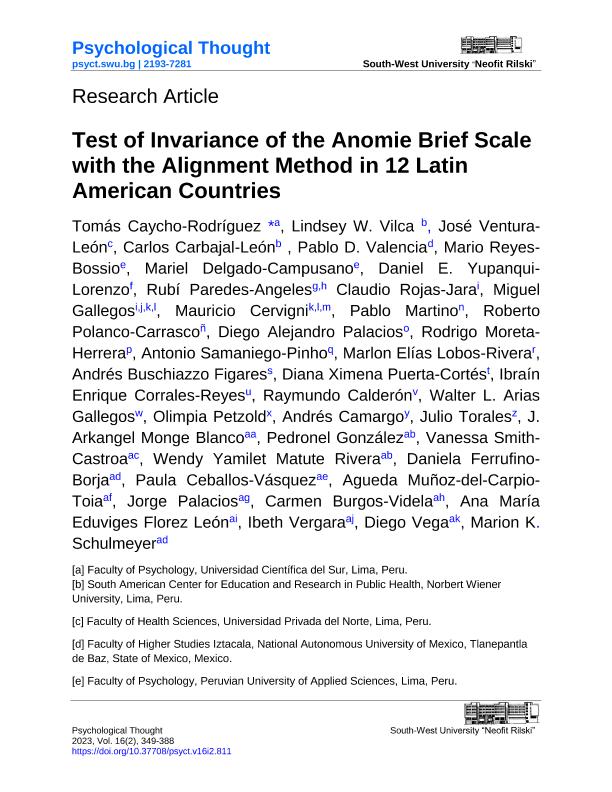Artículo
Test of Invariance of the Anomie Brief Scale with the Alignment Method in 12 Latin American Countries
Caycho Rodríguez, Tomás; Vilca, Lindsey W.; Venturaleón, José; Carbajal León, Carlos; Valencia, Pablo D.; Reyesbossio, Mario; Delgado Campusano, Mariel; Yupanquilorenzo, Daniel E.; Paredes Angeles, Rubí; Rojas Jara, Claudio; Gallegos de San Vicente, Miguel Omar ; Cervigni, Mauricio Alejandro
; Cervigni, Mauricio Alejandro ; Martino, Pablo Luis
; Martino, Pablo Luis ; Polanco Carrasco, Roberto; Palacios, Diego Alejandro; Moretaherrera, Rodrigo; Samaniego Pinho, Antonio; Lobos Rivera, Marlon Elías; Figares, Andrés Buschiazzo; Puerta Cortés, Diana Ximena; Corrales Reyes, Ibraín Enrique; Calderón, Raymundo; Gallegos, Walter L. Arias; Petzold, Olimpia; Camargo, Andrés; Torales, Julio; Arkangel Monge Blanco, J.; González, Pedronel; Smithcastroa, Vanessa; Rivera, Wendy Yamilet Matute; Ferrufinoborja, Daniela; Ceballos Vásquez, Paula; Muñoz del Carpiotoia, Agueda; Palacios, Jorge; Burgos Videla, Carmen; León, Ana María Eduviges Florez; Vergara, Ibeth; Vega, Diego; Schulmeyer, Marion K.
; Polanco Carrasco, Roberto; Palacios, Diego Alejandro; Moretaherrera, Rodrigo; Samaniego Pinho, Antonio; Lobos Rivera, Marlon Elías; Figares, Andrés Buschiazzo; Puerta Cortés, Diana Ximena; Corrales Reyes, Ibraín Enrique; Calderón, Raymundo; Gallegos, Walter L. Arias; Petzold, Olimpia; Camargo, Andrés; Torales, Julio; Arkangel Monge Blanco, J.; González, Pedronel; Smithcastroa, Vanessa; Rivera, Wendy Yamilet Matute; Ferrufinoborja, Daniela; Ceballos Vásquez, Paula; Muñoz del Carpiotoia, Agueda; Palacios, Jorge; Burgos Videla, Carmen; León, Ana María Eduviges Florez; Vergara, Ibeth; Vega, Diego; Schulmeyer, Marion K.
 ; Cervigni, Mauricio Alejandro
; Cervigni, Mauricio Alejandro ; Martino, Pablo Luis
; Martino, Pablo Luis ; Polanco Carrasco, Roberto; Palacios, Diego Alejandro; Moretaherrera, Rodrigo; Samaniego Pinho, Antonio; Lobos Rivera, Marlon Elías; Figares, Andrés Buschiazzo; Puerta Cortés, Diana Ximena; Corrales Reyes, Ibraín Enrique; Calderón, Raymundo; Gallegos, Walter L. Arias; Petzold, Olimpia; Camargo, Andrés; Torales, Julio; Arkangel Monge Blanco, J.; González, Pedronel; Smithcastroa, Vanessa; Rivera, Wendy Yamilet Matute; Ferrufinoborja, Daniela; Ceballos Vásquez, Paula; Muñoz del Carpiotoia, Agueda; Palacios, Jorge; Burgos Videla, Carmen; León, Ana María Eduviges Florez; Vergara, Ibeth; Vega, Diego; Schulmeyer, Marion K.
; Polanco Carrasco, Roberto; Palacios, Diego Alejandro; Moretaherrera, Rodrigo; Samaniego Pinho, Antonio; Lobos Rivera, Marlon Elías; Figares, Andrés Buschiazzo; Puerta Cortés, Diana Ximena; Corrales Reyes, Ibraín Enrique; Calderón, Raymundo; Gallegos, Walter L. Arias; Petzold, Olimpia; Camargo, Andrés; Torales, Julio; Arkangel Monge Blanco, J.; González, Pedronel; Smithcastroa, Vanessa; Rivera, Wendy Yamilet Matute; Ferrufinoborja, Daniela; Ceballos Vásquez, Paula; Muñoz del Carpiotoia, Agueda; Palacios, Jorge; Burgos Videla, Carmen; León, Ana María Eduviges Florez; Vergara, Ibeth; Vega, Diego; Schulmeyer, Marion K.
Fecha de publicación:
08/2023
Editorial:
South-West University "Neofit Rilski"
Revista:
Psychological Thought
e-ISSN:
2193-7281
Idioma:
Inglés
Tipo de recurso:
Artículo publicado
Clasificación temática:
Resumen
The Social Anomie Brief Scale (SAS10) is a self-report measure of social anomie against new social standards implemented during the current COVID-19 pandemic. The main objective of this study was to evaluate the invariance of the cross-cultural measurement of the SAS10 in a sample of 12 Latin American countries. Additionally, the difficulty and discrimination characteristics of the items were evaluated using the IRT and social anomie was compared between the participating countries. A total of 4,911 people from 12 Latin American countries (Argentina, Bolivia, Chile, Colombia, Cuba, Ecuador, Guatemala, Mexico, Paraguay, Peru, Uruguay, and Venezuela) selected by non-probabilistic snowball sampling participated. The results indicated that the original two-factor model of the SAS10 shows estimation problems and low fit indices in several countries. However, a model of two related dimensions (behavioral and affective) of nine items (SAS-9) presented adequate fit indices in all countries. This model presents adequate estimation of reliability and approximate cross-cultural measurement invariance. Peru was the country with the highest score in the behavioral dimension of social anomie; while Venezuela and Bolivia presented the highest scores in the affective dimension. Mexico was one of the countries with the lowest anomie scores. The results of the IRT would indicate that the characteristics of the SAS-9 items were appropriate. It is concluded that the SAS-9 has shown good psychometric properties when evaluated in 12 Latin American countries and can be used in future studies that compare social anomie cross-culturally.
Palabras clave:
COVID-19
,
CROSS-CULTURAL
,
INVARIANCE
,
SOCIAL ANOMIE
Archivos asociados
Licencia
Identificadores
Colecciones
Articulos(CCT - SAN LUIS)
Articulos de CTRO.CIENTIFICO TECNOL.CONICET - SAN LUIS
Articulos de CTRO.CIENTIFICO TECNOL.CONICET - SAN LUIS
Citación
Caycho Rodríguez, Tomás; Vilca, Lindsey W.; Venturaleón, José; Carbajal León, Carlos; Valencia, Pablo D.; et al.; Test of Invariance of the Anomie Brief Scale with the Alignment Method in 12 Latin American Countries; South-West University "Neofit Rilski"; Psychological Thought; 16; 2; 8-2023; 349-388
Compartir
Altmétricas



